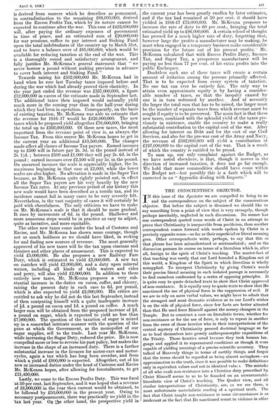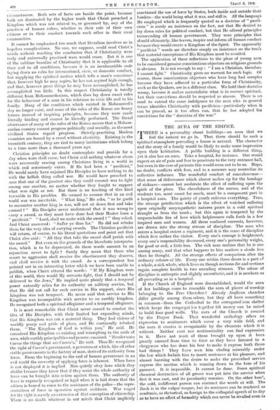THE CONSCIENTIOUS OBJECTOR.
TN this issue of the Spectator we are compelled to bring to an end the correspondence on the subject of the conscientious objector. But before the subject is dismissed We should like to say something from a point of view that is very strangely, though perhaps inevitably, neglected in such discussions. No sooner has one correspondent quoted some words of Christ in an attempt to prove that Christianity is inseparable from pacificism, than another correspondent comes forward with words spoken by Christ in a precisely opposite sense—so far as their superficial or literal meaning goes. Other correspondents write, perhaps, to say that this or that phrase has been misunderstood or mistranslated ; and so the discussion pursues its course on terms of a literalism which is, after all, foreign to the spirit of Christ's teaching. The master-fact of that teaching was surely that our Lord founded a Kingdom not of this world, a Kingdom of the Spirit to which literalism is wholly misapplied. To interpret Christianity by giving Christ's words their precise literal meaning in each isolated passage is necessarily to find ourselves confronted by a series of opposing principles. It is quite easy to quote detached texts to show that Christ approved of non-resistance. It is equally easy to quote texts to show that He sanctioned the use of physical force in the suppression of evil. If we are to rely on mere verbal values, we might have to admit that the strongest and most dramatic evidence as to our Lord's wishes is on the side of physical force, since few facts are better attested than that He used force Himself against the money-changers in the Temple. But to construct a case on literalistic terms, whether for non-resistance or for the use of force, is only to repeat in, another form the error of those heretics who in their interpretations of the central mystery of Christianity pressed doctrinal language so far as to lead themselves into grossly anthropomorphic expositions of the Trinity. Those heretics erred because they took human Ian_ guage and applied it to supernatural conditions as though it were capable of yielding meanings of a precise scientific accuracy. They talked of Heavenly things in terms of earthly things, and 'forgot that the terms should be regarded as being almost metaphors—an approximation to the truth, since it was possible to make definitions only in equivalent values and not in identical vatic 3. The mistake of all who exalt non-resistance into a Christian duty prescribed by Christ Himself seems to us to be founded on an unwarrantable literalistic view of Christ's teaching. The Quaker view, and all similar interpretations of Christianity, are, as we see them, a most unfortunate materialistic reading of a spiritual truth. The fact that Christ taught non-resistance in some circumstances is as irrelevant as the fact that He sanctioned resort to violence in other
circumstances. Both sets of facts are beside the point, because both are dominated by the higher truth that Christ preached a Kingdom which was not related to, or governed by, any of the practices of human rulers, whether in their rule of their own citizens or in their conduct towards each other in their rival communities.
It cannot be emphasized too much that literalism involves us in hopeless complications. No one, we suppose, could read Christ's words without reaching the conclusion that if Christianity were truly and universally practised wars would cease. But it is one of the sublime beauties of Christianity that it is applicable to all time and to all conditions, because it is an inexhaustible code laying down no rules for international, civic, or domestic conduct, but supplying tho spiritual motive which tells a man's conscience that, however high he may aspire, he has not aspired high enough, and that, however great things he may have accomplished, he has accomplished too little. In this respect Christianity is totally different from Mohammedanism, which does lay down exact rules for the behaviour of a man in his relations to civic life and in his family. Many of the conditions which existed in Mohammed's day no longer exist, and some of the rules of the Koran are heavy fetters instead of inspiring principles, because they were made literally binding and cannot be literally performed. The literal observance of many of the rules of the Koran means that a Moham- medan country cannot progress politically and socially, as the most civilized States regard progress. Strictly-practising Moslem countries are bound by a creed without elasticity. Existing in the twentieth century, they are tied to many institutions which belong to a time more than a thousand years ago.
Christian principles no doubt contemplate and provide for a day when wars shall cease, but Christ said nothing whatever about wars necessarily ceasing among Christians living in a world in which evil notoriously exists. If He had been a " pa,cificist," He would surely have enjoined His Disciples to have nothing to do with the hellish thing called war. He would have preached to men that one of the greatest sins they could commit was to fight among one another, no matter whether they fought to support what was right or not. But there is no teaching of this kind traceable in His parables. He seemed to assume that in an evil world war was inevitable. "What king," He asks, "as he goeth to encounter another king in war, will not sit down first and take counsel ? " His Disciples never understood that it was wrong to carry a sword, as they must have done had their Master been a " pacificist." "Lord, shall we smite with the sword ? " they asked. And Christ answered : "Suffer ye thus far." He did not rebuke them for the very idea of carrying swords. The Christian pacificist will return, of course, to his literal quotations and point out that Christ also said : "All they that take the sword shall perish with the sword." But even on the grounds of the literalistic interpreta- tion, which is to be deprecated, do these words amount to an injunction never to fight ? Surely they mean that those who resort to aggression shall receive the chastisement they deserve, and shall receive it with the sword. As a correspondent has pointed out in an interesting letter which we have been unable to publish, when Christ uttered the words : "If My Kingdom were of this world, then would My servants fight, that I should not be delivered to the Jews," Ho implied quite plainly that a temporal power naturally relies for its authority on military service, but that He did not call for such service in His support, since His Kingdom was not temporal. He never said that service to His Kingdom was incompatible with service to an earthly kingdom. He recognized both a spiritual allegiance and a temporal allegiance.
It is most remarkable that Christ never ceased to combat the idea of His Disciples, with their limited but expanding minds, that His Kingdom was not a material thing. They had visions of worldly pomp and pride of place, and He continually rebuked them. "The Kingdom of God is within you," He said. He conceived His Kingdom as existing and triumphing in the souls of men, while earthly principalities and powers: ermined. "Render unto Caesar the things that are Caesar's," He said. Thus He recognized the right of Caesar's government, a government which, like all other stable governments in the history of man, derived its authority from force. From the beginning to the end of human governance in an evil world the necessity of applying force is inherent,. When force is not displayed it is implied. Men quietly obey laws which they dislike because they know that if they resist the whole authority of force can be brought into action against them. The authority of force is expressly recognized as legal when it is laid down that the citizen is bound to come to the assistance of the police—the repre- sentatives of force in operation against evildoers. War waged for the right is merely an extension of that conception of citizenship. There is no doubt whatever in our minds that Christ implicitly sanctioned the use of force by States, both inside and outside their borders—the world being what it was, and still is. All the language He employed which is frequently quoted as a doctrine of " pacifi- cism " is surely an insistence on the fact, not that He desired to lay down rules for political conduct, but that He offered principles transcending all human government. They were principles that should ultimately, like leaven, inspire and inform all human conduct because they would create a Kingdom of the Spirit. The apparently " pacificist " words are therefore simply an insistence on the truth that material conceptions of His Kingdom must be avoided.
The application of these reflections to the pleas of young men to be considered genuine conscientious objectors on religious grounds is obvious. It is not enough to say : "I am a Christian, therefore I cannot fight." Christianity gives no warrant for such logic. Of course, those conscientious objectors who have long had scruples because they have adhered to a particular form of Christianity, such as the Quakers, are in a different class. We hold their doctrine wrong, because it makes materialistic what is in essence spiritual, but their convictions should be respected as sincere. There is no need to extend the same indulgence to the man who in general terms identifies Christianity with pacificism—particularly when it can be proved, as it too often can, that he has adopted his convictions for the "duration of the war."



































 Previous page
Previous page